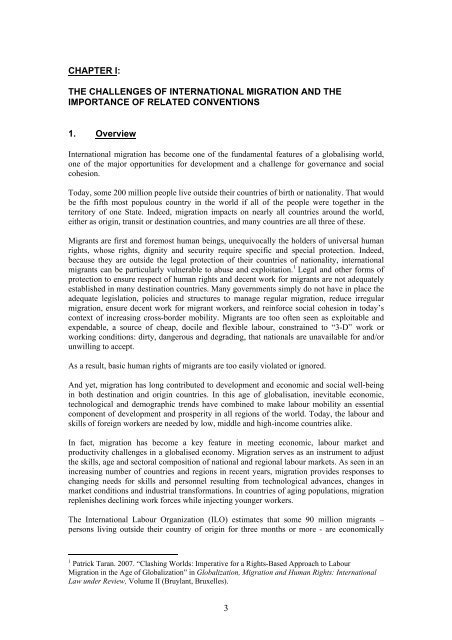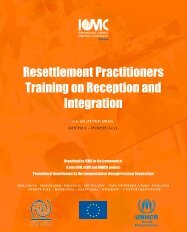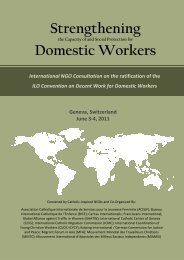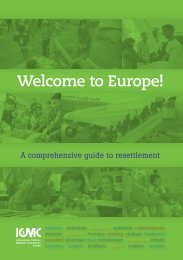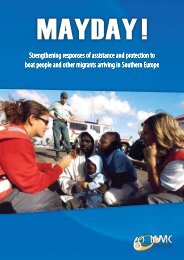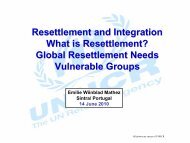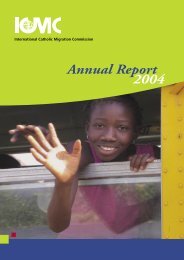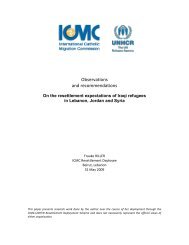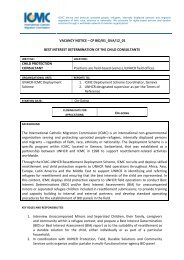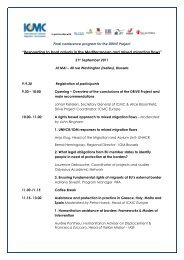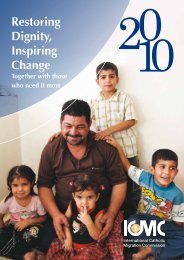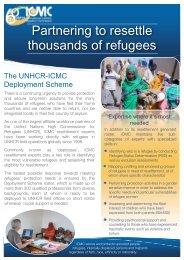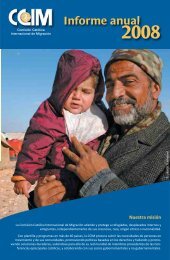Guide on ratification of the Migrant Workers Convention
Guide on ratification of the Migrant Workers Convention
Guide on ratification of the Migrant Workers Convention
Create successful ePaper yourself
Turn your PDF publications into a flip-book with our unique Google optimized e-Paper software.
CHAPTER I:<br />
THE CHALLENGES OF INTERNATIONAL MIGRATION AND THE<br />
IMPORTANCE OF RELATED CONVENTIONS<br />
1. Overview<br />
Internati<strong>on</strong>al migrati<strong>on</strong> has become <strong>on</strong>e <strong>of</strong> <strong>the</strong> fundamental features <strong>of</strong> a globalising world,<br />
<strong>on</strong>e <strong>of</strong> <strong>the</strong> major opportunities for development and a challenge for governance and social<br />
cohesi<strong>on</strong>.<br />
Today, some 200 milli<strong>on</strong> people live outside <strong>the</strong>ir countries <strong>of</strong> birth or nati<strong>on</strong>ality. That would<br />
be <strong>the</strong> fifth most populous country in <strong>the</strong> world if all <strong>of</strong> <strong>the</strong> people were toge<strong>the</strong>r in <strong>the</strong><br />
territory <strong>of</strong> <strong>on</strong>e State. Indeed, migrati<strong>on</strong> impacts <strong>on</strong> nearly all countries around <strong>the</strong> world,<br />
ei<strong>the</strong>r as origin, transit or destinati<strong>on</strong> countries, and many countries are all three <strong>of</strong> <strong>the</strong>se.<br />
<strong>Migrant</strong>s are first and foremost human beings, unequivocally <strong>the</strong> holders <strong>of</strong> universal human<br />
rights, whose rights, dignity and security require specific and special protecti<strong>on</strong>. Indeed,<br />
because <strong>the</strong>y are outside <strong>the</strong> legal protecti<strong>on</strong> <strong>of</strong> <strong>the</strong>ir countries <strong>of</strong> nati<strong>on</strong>ality, internati<strong>on</strong>al<br />
migrants can be particularly vulnerable to abuse and exploitati<strong>on</strong>. 1 Legal and o<strong>the</strong>r forms <strong>of</strong><br />
protecti<strong>on</strong> to ensure respect <strong>of</strong> human rights and decent work for migrants are not adequately<br />
established in many destinati<strong>on</strong> countries. Many governments simply do not have in place <strong>the</strong><br />
adequate legislati<strong>on</strong>, policies and structures to manage regular migrati<strong>on</strong>, reduce irregular<br />
migrati<strong>on</strong>, ensure decent work for migrant workers, and reinforce social cohesi<strong>on</strong> in today’s<br />
c<strong>on</strong>text <strong>of</strong> increasing cross-border mobility. <strong>Migrant</strong>s are too <strong>of</strong>ten seen as exploitable and<br />
expendable, a source <strong>of</strong> cheap, docile and flexible labour, c<strong>on</strong>strained to “3-D” work or<br />
working c<strong>on</strong>diti<strong>on</strong>s: dirty, dangerous and degrading, that nati<strong>on</strong>als are unavailable for and/or<br />
unwilling to accept.<br />
As a result, basic human rights <strong>of</strong> migrants are too easily violated or ignored.<br />
And yet, migrati<strong>on</strong> has l<strong>on</strong>g c<strong>on</strong>tributed to development and ec<strong>on</strong>omic and social well-being<br />
in both destinati<strong>on</strong> and origin countries. In this age <strong>of</strong> globalisati<strong>on</strong>, inevitable ec<strong>on</strong>omic,<br />
technological and demographic trends have combined to make labour mobility an essential<br />
comp<strong>on</strong>ent <strong>of</strong> development and prosperity in all regi<strong>on</strong>s <strong>of</strong> <strong>the</strong> world. Today, <strong>the</strong> labour and<br />
skills <strong>of</strong> foreign workers are needed by low, middle and high-income countries alike.<br />
In fact, migrati<strong>on</strong> has become a key feature in meeting ec<strong>on</strong>omic, labour market and<br />
productivity challenges in a globalised ec<strong>on</strong>omy. Migrati<strong>on</strong> serves as an instrument to adjust<br />
<strong>the</strong> skills, age and sectoral compositi<strong>on</strong> <strong>of</strong> nati<strong>on</strong>al and regi<strong>on</strong>al labour markets. As seen in an<br />
increasing number <strong>of</strong> countries and regi<strong>on</strong>s in recent years, migrati<strong>on</strong> provides resp<strong>on</strong>ses to<br />
changing needs for skills and pers<strong>on</strong>nel resulting from technological advances, changes in<br />
market c<strong>on</strong>diti<strong>on</strong>s and industrial transformati<strong>on</strong>s. In countries <strong>of</strong> aging populati<strong>on</strong>s, migrati<strong>on</strong><br />
replenishes declining work forces while injecting younger workers.<br />
The Internati<strong>on</strong>al Labour Organizati<strong>on</strong> (ILO) estimates that some 90 milli<strong>on</strong> migrants –<br />
pers<strong>on</strong>s living outside <strong>the</strong>ir country <strong>of</strong> origin for three m<strong>on</strong>ths or more - are ec<strong>on</strong>omically<br />
1 Patrick Taran. 2007. “Clashing Worlds: Imperative for a Rights-Based Approach to Labour<br />
Migrati<strong>on</strong> in <strong>the</strong> Age <strong>of</strong> Globalizati<strong>on</strong>” in Globalizati<strong>on</strong>, Migrati<strong>on</strong> and Human Rights: Internati<strong>on</strong>al<br />
Law under Review, Volume II (Bruylant, Bruxelles).<br />
3


